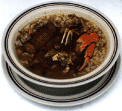|
|
|
 |
||||||||||||||||
| Back to Homepage | Catering to Convenience | Foodies Kitchen...| Living to Eat | ||||||||||||||||
| Jaques Imos Review | Scenes from the Balcony | Traffic | ||||||||||||||||
 |
||||||||||||||||
 |
||||||||||||||||
|
The high-pitched melody of pots, pans, and plates clinking combined with the low buzz of conversation fills the air as a mid-fortyish brunette leisurely awaits her meal. A voice asks from across the counter, "What are you doing with all of the time you're saving at Foodies?" The elegant brunette tilts up a glass filled with a warm amber liquid (that we assume is wine), and with a nod of her head she salutes the voice with the glass and responds, "This." Is this excerpt taken from a "Foodies Kitchen" commercial indicative of a growing trend in New Orleans? After all, surely the New Orleans' motto "Laissez les bon temps rouler" -let the good times roll, doesn't apply to being stuck at home slaving over a stove. Is this desire for quicker, better food indicative of more active, consumptionist lifestyles for New Orleanians? With the increasing number of working adults in a given household, there seems to be less time and less inclination to provide home-cooked meals. According to the Foodies Kitchen Web site "Over one third of Americans say that they would like to eat more meals prepared away from home than cooked at home." Given the success of restaurants such as Foodies Kitchen and other companies such as Take-Out Taxi, not to mention the lines of cars rapped around fast food joints such as Burger King and McDonald's, it seems that many New Orleanians would agree. |
||||||||||||||||
 |
||||||||||||||||
|
This convenience food trend has even led to the opening of a Café Dumonde in Metairie, complete with drive through for people who want coffee and beignets "on-the-go". What does this say about the lifestyles of New Orleanians? What is the real picture? Surely we aren't all sitting back enjoying a glass of wine as the hub-bub of life goes on around us. So what are we doing with all of this time we're saving? And more importantly,how |
||||||||||||||||
|
might this new trend toward a consuptionist, convenience-catered lifestyle affect us? Take a look at a slightly different picture from the one portrayed above. Scenario: Two kitchens, dinnertime, two families sitting down to enjoy a meal. In the first kitchen the scents that fill the room are a combination of right-out-of-the-oven turkey, homemade pecan pie, and the yeasty scent of warm rolls. A young boy, about ten years old, sits down in his regular chair and attempts to make faces at his older sister in hopes that this will annoy her to no end. However, much to his chagrin, the large bowl of snowy, white mashed potatoes thwarts his attempts. His mother playfully swats at him, admonishing him to behave as she places a large plate of dinner rolls on the table. Now, picture this…. In the second kitchen the scents that fill the air are acrid smells of burned plastic (mom forgot to take the lid off of the take-out container when reheating). Another ten-year-old boy sits down in his regular chair and pries the scorched lid off of his take-out container while his mom passes around the plastic utensils (no use wasting time doing dishes). No conversation, everyone is rushing through their individually-packaged meals so that they can get on with the rest of their evening, which of course will consist of TV. While this example may be a bit over the top, it does question what we may be sacrificing in our never-ending quest for everything "fast and easy". One of the quotes that line the walls of Foodies Kitchen comes form Oscar Wilde who said, "I hate people who are not serious about their meals." In New Orleans, everyone knows that we are serious about our food. However, we are losing an essential aspect of our culture. |
||||||||||||||||
 |
||||||||||||||||
|
How many of us today know how to make a good gumbo? How many of us even care? After all, if you want gumbo, you can just run out and buy a pint at Foodies, right? Throughout history cooking has been an integral part of our culture. Along with oral folktales and legends, recipes have been passed down through the generations. This is not only true of New Orleans, but of every culture. My mother brought family recipes with her when she came to this country from Cuba. Recipes that she was taught by her mother, who was |
||||||||||||||||
| taught by her mother, and so on. There is no question about faster being convenient; However, when we take into consideration the larger aspects of this convenience and its potential impact on our ability to hand down our heritage, we have to ask: Is faster really better? | ||||||||||||||||